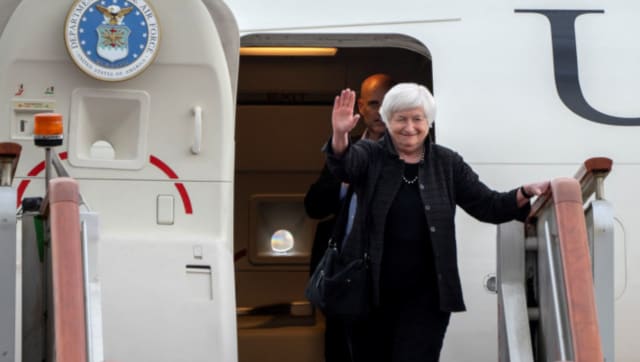
The “existential threat” of climate change must be addressed by the world’s two greatest economies, the United States and China, said U.S. Treasury Secretary Janet Yellen addressing Chinese officials and climate scientists on Saturday.
The 2015 Paris Agreement was made possible thanks to US and Chinese cooperation on climate change, according to Yellen, who added that both governments wanted to support emerging markets and developing nations as they work to achieve their climate goals.
“Continued U.S.-China cooperation on climate finance is critical,” Yellen said in a prepared text at a climate roundtable in Beijing.
“As the world’s two largest emitters of greenhouse gases and the largest investors in renewable energy, we have both a joint responsibility – and ability – to lead the way.”
China, which the UN has designated as a developing nation, has long insisted that rich countries are obligated to assist poorer nations in financing efforts to combat climate change. Beijing, though, asserts that it might voluntarily contribute to “loss and damage” brought on by climate change.
Cooperation between the U.S. and China is regarded as essential to global efforts to mitigate the worst effects of climate change due to its enormity.
Yellen emphasised the necessity of effective and efficient financing for such initiatives, adding that Beijing’s support for already-existing multilateral climate institutions like the Green Climate Fund (GCF) and the Climate Investment Funds, along with that of Washington and others, could increase the impact of these institutions.
A US Treasury official stated that China is welcome to join the US in making a contribution to the September round of fund pledges for the GCF. According to President Joe Biden, the United States will provide an additional $1 billion to that fund replenishment.
The GCF is a UNFCCC (United Nations Framework Convention on Climate Change) fund that provides assistance to developing nations with climate change adaptation and mitigation strategies.
As a result of Nancy Pelosi, the then-Speaker of the US House of Representatives, visiting Taiwan last year, China temporarily halted discussions with the US on issues such as security, climate change, and other topics.
Additionally addressing at the discussion, US Ambassador to China Nicholas Burns expressed excitement for US Climate Envoy John Kerry’s arrival. According to Kerry, he has been invited to visit China soon.
According to a statement from the U.S. Treasury Department, Yellen also made a second appearance at the Summit for a New Global Financing Pact in Paris last month, where she was glad to join world leaders, including Premier Li Qiang.
Li had stated during the conference that China is prepared to collaborate with other nations to create a global partnership for clean energy cooperation based on the tenets of reciprocity and shared but “differentiated” responsibilities.
According to research firm Morningstar, China has overtaken the United States as the largest market for climate funds after Europe. Funds in China have increased by more than twofold since 2021 to $46.7 billion.
To achieve its goal of net-zero carbon emissions by 2060, China, according to the World Bank, will need to invest up to $17 trillion more in green infrastructure and technologies in the power and transportation sectors. This highlights the importance of private investment.
“It is also critical that we encourage economy-wide transitions toward net-zero, which needs to include the private sector,” Yellen said.
Yellen said she looked forward to hearing recommendations from working groups at the upcoming Group of 20 finance ministers meetings in India, including the Sustainable Finance Working Group, which the United States and China co-chair.
“This is a good of example of what our bilateral cooperation can achieve – and we should build on it in multilateral forums,” she said.
(With agency inputs)






